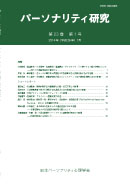Volume 24, Issue 1
Displaying 1-9 of 9 articles from this issue
- |<
- <
- 1
- >
- >|
Articles
-
Article type: Article
2015 Volume 24 Issue 1 Pages 1-14
Published: July 31, 2015
Released on J-STAGE: August 07, 2015
Download PDF (511K) -
Article type: Article
2015 Volume 24 Issue 1 Pages 15-25
Published: July 31, 2015
Released on J-STAGE: August 07, 2015
Download PDF (533K) -
Article type: Article
2015 Volume 24 Issue 1 Pages 26-37
Published: July 31, 2015
Released on J-STAGE: August 07, 2015
Download PDF (602K) -
Article type: Article
2015 Volume 24 Issue 1 Pages 38-48
Published: July 31, 2015
Released on J-STAGE: August 07, 2015
Download PDF (544K) -
Article type: Article
2015 Volume 24 Issue 1 Pages 49-60
Published: July 31, 2015
Released on J-STAGE: August 07, 2015
Download PDF (524K) -
Article type: Article
2015 Volume 24 Issue 1 Pages 61-76
Published: July 31, 2015
Released on J-STAGE: August 07, 2015
Download PDF (699K) -
Article type: Article
2015 Volume 24 Issue 1 Pages 77-87
Published: July 31, 2015
Released on J-STAGE: August 07, 2015
Download PDF (352K)
Short Reports
-
Article type: Short Report
2015 Volume 24 Issue 1 Pages 88-90
Published: July 31, 2015
Released on J-STAGE: August 07, 2015
Download PDF (245K) -
Article type: Short Report
2015 Volume 24 Issue 1 Pages 91-93
Published: July 31, 2015
Released on J-STAGE: August 07, 2015
Download PDF (296K)
- |<
- <
- 1
- >
- >|
